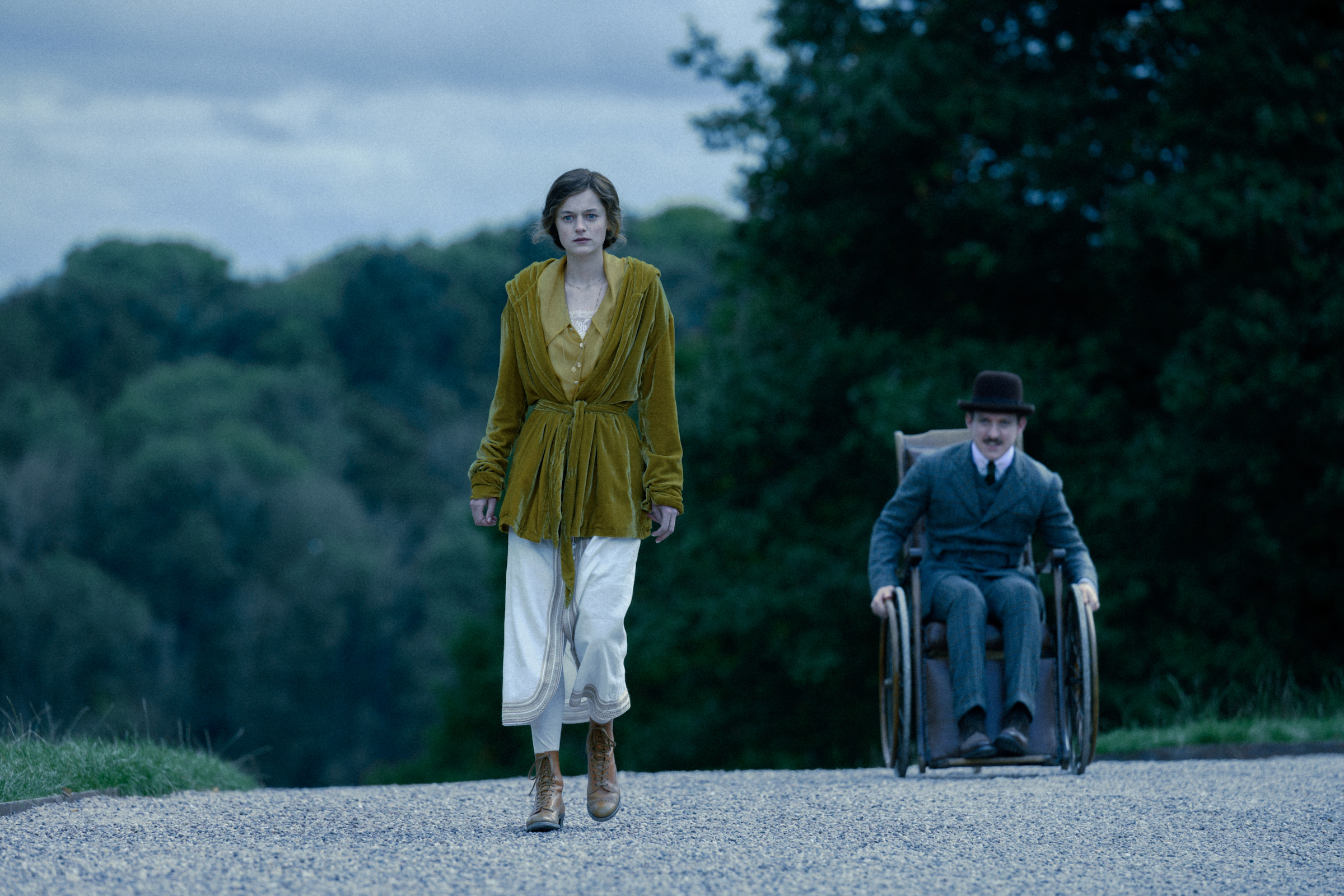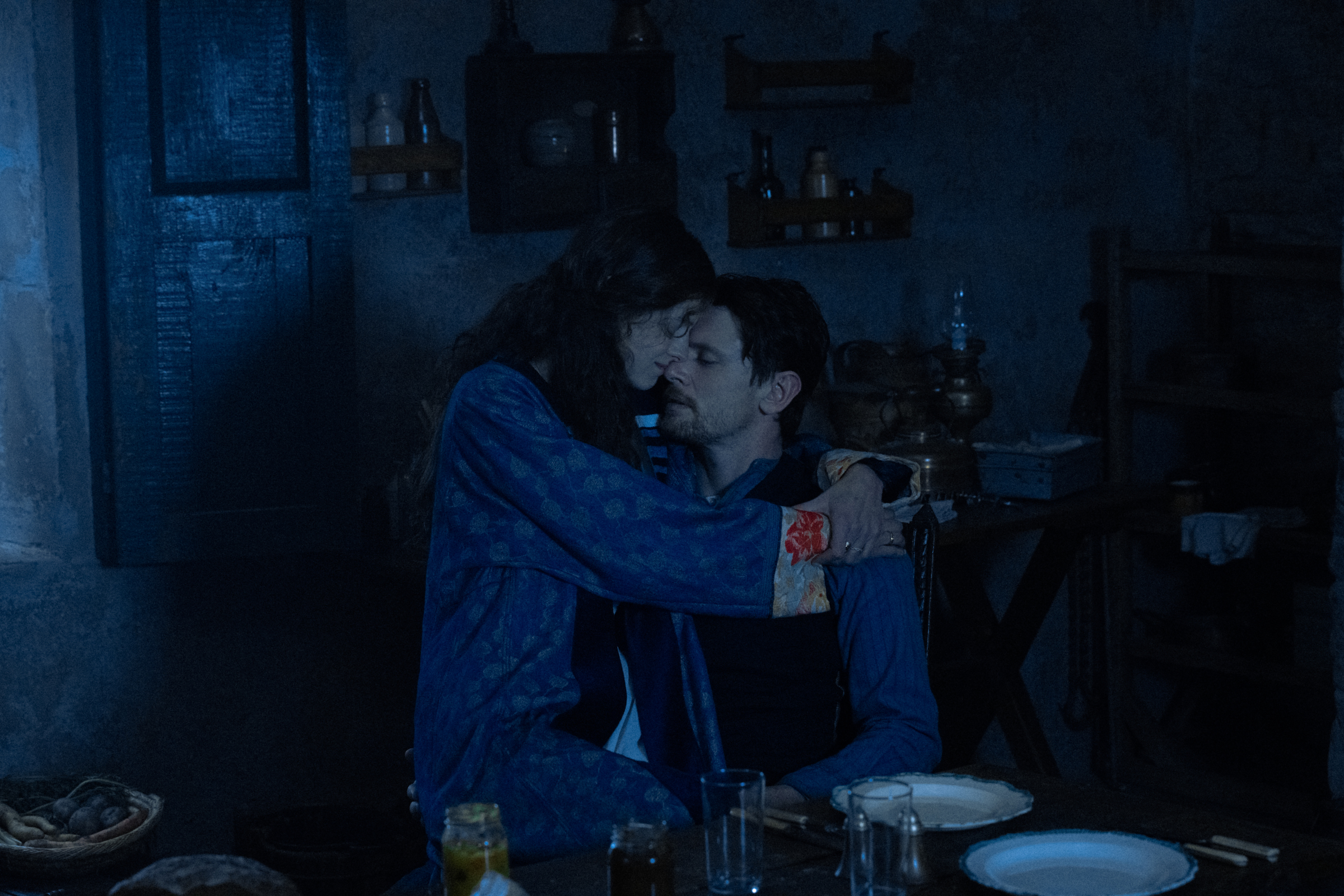To rescue a book from its status as a punchline is a noble goal, and Laure de Clermont-Tonnerre has pulled it off with her thoughtful and radiantly carnal adaptation of D.H. Lawrence’s Lady Chatterley’s Lover, a book many people think they know even if they’ve never read it. Full disclosure: I haven’t read it either, but now I will, given the complexity, ambition and beauty of Clermont-Tonnerre’s film. The picture is, in places, a bit decorous; set on an estate in the English countryside, it’s gorgeous to look at, which always sets off the old Masterpiece Theater alarm—does this thing look good only because this gorgeous landscape is impossible to ruin? (The cinematography is by veteran DP Benoît Delhomme, and it’s sparkling no matter what, as are Emma Fryer’s costumes.) But even if you believe you’re settling in for just another Lady Chatterley adaptation—there have been plenty already—at least this is a film, a rather sexually explicit one, that’s reaching for something rather than shrinking away. In a world where we always seem to be recoiling, where refusal and fear are always easier than saying yes, Clermont-Tonnerre and her actors strive for boldness. If Lawrence’s ideas were radical, and sometimes unpopular, in the late 1920s, they can still rattle us today—and maybe we need to be rattled.
Emma Corrin (splendid, recently, as the young Lady Diana in The Crown) plays Connie Reid, a well-heeled young woman who has just married a baronet, Matthew Duckett’s Clifford Chatterley. That means she has married well, and she’s happy enough with her new husband, who’s just about to go off to war. But everything changes when he comes back: he has suffered injuries that have permanently confined him to a wheelchair. Connie has become the mistress of his family estate, also inheriting a stuffy bedroom decorated with stale Victoriana. And the sex life to which she was clearly looking forward at the beginning of her marriage has evaporated. Clifford assures her that it doesn’t bother him much—he’ll be all right. But he doesn’t stop to think about what this new life might mean for her.

He does, however, want an heir, and he’s open-minded enough to suggest, to Connie’s initial horror, that she go out and discreetly find a suitable lover to serve as sperm donor. His rules are firm—Connie must not get emotionally attached to this stud-slash-paramour—which means they’re just begging to be broken. And sure enough, Connie’s loneliness and sexual frustration intensify into a firestorm around one of Clifford’s employees, the former army officer, well-read but of the lower classes, he has recently hired as gameskeeper. Oliver Mellors (Jack O’Connell) may not literally own the property he works on, but he’s the king of it even so, his heavy boots familiar with every inch of it, rough scarves tucked jauntily into his work shirts, more dashing than any silk cravat. Connie begins to find more excuses to stop by the little hut where Oliver works, always with a book in tow. Soon she starts forgetting the book. She’s particularly entranced by a group of newly hatched pheasant chicks—she asks Oliver if she can touch one, but she’s afraid. He gently cups her hand in his, and they scoop up a chick as one. It’s only a matter of time before they’re meeting, every chance they get, for sex that’s at first purely hungry and later, as their emotional attachment blossoms, more fine-tuned.
This can end well for neither of them, but their love is pure even so. It’s also what opens Connie’s eyes to the useless rigidity of class distinctions, and to her husband’s real shortcomings, which have nothing to do with the state of his hydraulics. Clifford thinks he’s a member of the ruling class for one reason, to rule, and that’s perfectly fine by him. The closer Connie draws to her cottage lover, the more repellent she finds her husband. She also comes to see the real damage that war does to men, and how they need to find tenderness within themselves to counteract it. Clermont-Tonnerre deftly weaves these ideas into the narrative, but her actors never come off as mere mouthpieces for concepts. Corrin is wonderful. She plays Connie as a woman who’s picking up signals from the air around her, little bits of information about how to live and breathe that have never managed to reach her before. And O’Connell plays Oliver with the right balance of scampish joy and wariness. As the duo’s commitment deepens, the danger around them escalates. “We haven’t thought beyond tomorrow, have we?” he says to Connie, who harbors dreams of running away with him. O’Connell brushes the moment with a kind of pragmatic mournfulness.

Read more reviews by Stephanie Zacharek
The love scenes between these two, as Clermont-Tonnerre handles them, are vital and believable—no faux-modest bedsheet-bandeaus here. They’re not so much what we used to call, in the olden days, “explicit sex.” The degree of emotional intimacy between these two characters is what makes the sex scenes steamy—the way Oliver’s hands instinctively reach for Connie’s, seeking the entwinement of fingers, or the way their kisses last a few seconds more than we’re used to, because no one is running a timer. There’s ridiculous stuff, too, like the way the lovers dance naked and free outdoors in the dappled sun, with flowers tucked behind their ears, or behind their whatever. Scenes like these remind me of a little poem a friend of mine used to recite every May 1st—“Hooray, hooray, the first of May, outdoor [blank]ing starts today!”—a joyful ditty nonetheless imbued with an acknowledgment that the reality of the thing rarely lives up to the idea of it.
But the joy-of-nature stuff, even at its silliest, is part of Lawrence’s ethos, his eagerness to embrace sex as an antidote to the oppressiveness of the workaday world. And couldn’t we all use a little more of that? Though Lawrence’s views of sex overall were complicated and sometimes contradictory, and not always what you’d call progressive, Clermont-Tonnerre and her actors draw from his ideas with clear-eyed generosity, presenting them so that they feel fresh as a new crocus. Clermont-Tonnerre’s last film was the marvelous 2019 picture The Mustang, starring Matthias Schoenaerts. The script is by David Magee, whose other adaptations include Life of Pi and Miss Pettigrew Lives for a Day. Together they honor the best of Lawrence’s ideas, and their actors join the dance.
There’s something else: in a 2006 introduction to a Penguin edition of Lady Chatterley’s Lover, Doris Lessing notes that she now sees the novel as “one of the most powerful anti-war novels ever written.” She also pinpoints another truth, possibly even more potent today than it was 17 years ago: “In parts of the world where women are not free, may be stoned to death or publicly hanged for adultery, this novel is being read as Lawrence wanted it read, as a manifesto for sex, for love.”
In the past 20 years, movies have become more sexually repressed, not less. Anyone who complains about excessive nudity or sex in today’s movies clearly isn’t watching many of them. Clermont-Tonnere’s Lady Chatterley’s Lover feels like a shout of freedom, albeit a gracefully tempered one. It’s as if she’s seeking new life for a novel that Lawrence himself rewrote several times—he completed the final reworking as he was dying of tuberculosis—and whose uncensored version was unavailable to readers until a famous court case at last drew back the veil, in 1960. It’s also, simply, a movie adaptation that makes you want to read the book it’s based on. Hooray, hooray! And why not?
More Must-Reads from TIME
- Why Trump’s Message Worked on Latino Men
- What Trump’s Win Could Mean for Housing
- The 100 Must-Read Books of 2024
- Sleep Doctors Share the 1 Tip That’s Changed Their Lives
- Column: Let’s Bring Back Romance
- What It’s Like to Have Long COVID As a Kid
- FX’s Say Nothing Is the Must-Watch Political Thriller of 2024
- Merle Bombardieri Is Helping People Make the Baby Decision
Contact us at letters@time.com